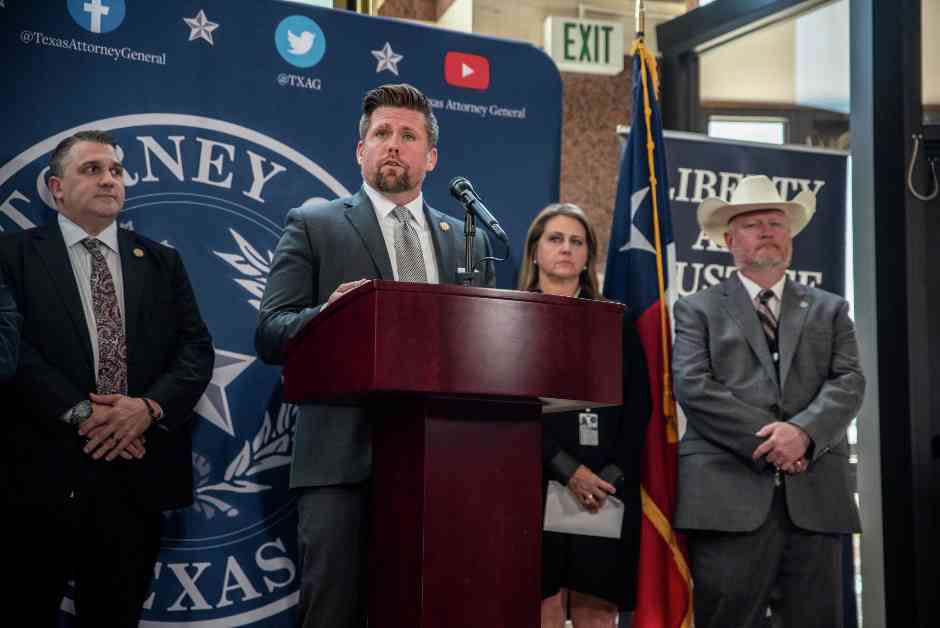Texas Supreme Court Questions Disciplinary Suit Against Top Paxton Aide
In a recent press conference in Austin, TX, Brent Webster, the First Assistant Attorney General of Texas, addressed the media regarding a professional misconduct case brought against him by a committee of the State Bar of Texas. The case centers around Webster’s involvement in filing a suit to overturn the 2020 presidential election, a move that has sparked controversy and legal scrutiny.
Challenging the Committee’s Motives
During oral arguments at the Texas Supreme Court, Justice Jimmy Blacklock expressed skepticism about the committee’s motivations, questioning whether they were driven by political bias. Blacklock raised concerns that the case against Webster was an attempt by a government entity to push a specific political agenda rather than uphold legal standards.
The implications of this case extend beyond Webster, as the court’s ruling could set a precedent for a similar case against Texas Attorney General Ken Paxton. Paxton and Webster had jointly challenged the election results in four battleground states won by Joe Biden, a move that was ultimately rejected by the U.S. Supreme Court for lack of standing.
Political Witch Hunt or Legal Accountability?
Paxton’s office has vehemently denied the allegations, characterizing the disciplinary suit as a political witch hunt orchestrated by the State Bar. They argue that the case is an attempt to undermine the will of the voters who elected Paxton in the first place.
Supporting Webster, eighteen Republican attorneys general filed a legal brief emphasizing that the case should not be used as a tool to suppress dissenting opinions or stifle political discourse. They argue that the disciplinary rules should not be weaponized to target officials for their political beliefs.
The Bar’s Perspective
Michael Graham, lead counsel for the bar’s Commission on Lawyer Discipline, countered the claim that the case was politically motivated, emphasizing that making false representations in court is a violation of professional standards regardless of political affiliations. He defended the committee’s actions as part of the normal grievance process outlined by bar rules.
Graham highlighted that the case was initiated after a review by the chief disciplinary counsel and multiple complaints from external sources, not as a result of political bias. He underscored the importance of upholding ethical standards within the legal profession and ensuring accountability for all attorneys, regardless of their positions.
Separation of Powers and Legal Immunity
Texas Solicitor General Aaron Nielson, representing Webster, argued that allowing the case to proceed would violate the separation of powers principle by allowing the judicial branch to interfere with executive actions. Nielson contended that Webster, as a government official, is entitled to sovereign immunity and should not be subject to disciplinary action.
However, the bar committee maintains that the case is not targeting Webster in his official capacity but rather as a licensed attorney in the state of Texas. They assert that the Supreme Court has the authority to regulate the practice of law and hold attorneys accountable for their actions, even if they hold public office.
Legal Precedent and Accountability
Justice Brett Busby expressed surprise at the argument for sovereign immunity, highlighting the court’s role in regulating the legal profession and ensuring ethical conduct among attorneys. While acknowledging the complexities of the case, Busby emphasized the importance of upholding professional standards and accountability within the legal community.
The outcome of this case will have far-reaching implications for the legal profession and the relationship between politics and professional ethics. As the Texas Supreme Court deliberates on the disciplinary suit against Webster, the decision will shape the future of legal accountability and the responsibilities of attorneys in upholding the rule of law.
In a broader context, this case underscores the challenges of balancing political beliefs with legal obligations and the need to maintain integrity and transparency within the legal system. As the legal community grapples with issues of professional misconduct and ethical standards, the case against Webster serves as a critical test of the legal system’s ability to uphold integrity and accountability in the face of political pressures.

